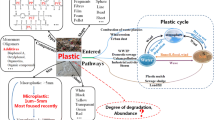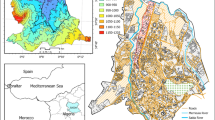Abstract
Mexico is one of the world’s leading mercury producers and exporters. However, mercury mining is carried out using artisanal procedures, which highly impact ecosystems. In the municipality of Pinal de Amoles, Queretaro, Mexico, artisanal mercury mining (AMM) is practiced in a region that has been categorized as a Biosphere Reserve. Therefore, a holistic health risk assessment for mercury was performed in the region, including environmental monitoring (air, water, and soil) and mercury exposure in both humans (children, women, and miners) and biota (plants, rodents, and worms). The atmospheric mercury determination was carried out using the JEROME® J405 analyzer, whereas total mercury in environmental and biological samples was determined by atomic absorption spectrophotometry/cold vapor. Results showed that mercury concentrations in the environmental and biological matrices exceeded their respective reference values. These results demonstrate the direct influence of AMM in the increasing levels of mercury in all the components of the studied ecosystem. Therefore, comprehensive intervention strategies must be implemented to reduce and prevent human health and ecological risks due to the presence of mercury. In this regard, the Minamata Convention for mercury control should include biomonitoring programs not only for humans but also for critical ecological receptors in polluted ecosystems.

Similar content being viewed by others
References
ACGIH. (2013). Mercury BEI.
ATSDR. Division of Toxicology and Environmental Medicine Prevention, R. and M. S. B. E. R. T. (2012). Action levels for elemental mercury spills. ATSDR Chemical Specific Health Consultation. https://www.atsdr.cdc.gov/emergencyresponse.html. Accessed 13 July 2019.
Camacho, A., Van Brussel, E., Carrizales, L., Flores-Ramírez, R., Verduzco, B., Huerta, S. R. A., Leon, M., & Díaz-Barriga, F. (2016). Mercury mining in Mexico: I. Community engagement to improve health outcomes from artisanal mining. Annals of Global Health, 82(1), 149–155. https://doi.org/10.1016/j.aogh.2016.01.014
CCME. (1999). Canadian soil quality guidelines for the protection of environmental and human health. Mercury (Inorganic). http://ceqg-rcqe.ccme.ca/download/en/270. Accessed 10 June 2019.
Cordy, P., Veiga, M. M., Salih, I., Al-Saadi, S., Console, S., Garcia, O., Mesa, L. A., Velásquez-López, P. C., & Roeser, M. (2011). Mercury contamination from artisanal gold mining in Antioquia, Colombia: The world’s highest per capita mercury pollution. Science of the Total Environment, 410–411, 154–160. https://doi.org/10.1016/j.scitotenv.2011.09.006
Dai, Z., Feng, X., Zhang, C., Wang, J., Jiang, T., Xiao, H., Li, Y., Wang, X., & Qiu, G. (2013). Assessing anthropogenic sources of mercury in soil in Wanshan Hg mining area, Guizhou. China. Environmental Science and Pollution Research, 20(11), 7560–7569. https://doi.org/10.1007/s11356-013-1616-y
DOF. (2000). Modificación a la Norma Oficial Mexicana NOM-127-SSA1–1994, Salud ambiental. Agua para uso y consumo humano. Límites permisibles de calidad y tratamientos a que debe someterse el agua para su potabilización. http://www.salud.gob.mx/unidades/cdi/nom/m127ssa14.html. Accessed 20 November 2018.
DOF. (2007). Norma Oficial Mexicana NOM-147-SEMARNAT/SSA1–2004, Que establece criterios para determinar las concentraciones de remediación de suelos contaminados por arsénico, bario, berilio, cadmio, cromo hexavalente, mercurio, níquel, plata, plomo, selenio, talio y/o vanadio. http://biblioteca.semarnat.gob.mx/janium/Documentos/Ciga/agenda/PP03/DO950.pdf. Accessed 20 November 2018.
Du, B., Li, P., Feng, X., Qiu, G., Zhou, J., & Maurice, L. (2016). Mercury exposure in children of the wanshan mercury mining area, Guizhou, China. International Journal of Environmental Research and Public Health, 13(11). https://doi.org/10.3390/ijerph13111107
Eagles-Smith, C. A., Silbergeld, E. K., Basu, N., Bustamante, P., Diaz-Barriga, F., Hopkins, W. A., Kidd, K. A., & Nyland, J. F. (2018). Modulators of mercury risk to wildlife and humans in the context of rapid global change. Ambio, 47(2), 170–197. https://doi.org/10.1007/s13280-017-1011-x
EPA. (1996). Method 3052. Microwave assisted acid digestion of siliceous and organically based matrices. https://www.epa.gov/sites/production/files/2015-12/documents/3052.pdf. Accessed 17 May 2019.
EPA. (2007a). Method 3015A. Microwave assisted acid digestion of aqueous samples and extracts. https://www.epa.gov/sites/production/files/2015-12/documents/3015a.pdf. Accessed 17 May 2019.
EPA. (2007b). Method 3051A. Microwave assisted acid digestion of sediments, sludges, soils, and oils. https://www.epa.gov/sites/production/files/2015-12/documents/3051a.pdf. Accessed 17 May 2019.
Esdaile, L. J., & Chalker, J. M. (2018). The mercury problem in artisanal and small-scale gold mining. Chemistry - A European Journal, 24(27), 6905–6916. https://doi.org/10.1002/chem.201704840
Health Organization Regional Office for Europe. (2015). Human biomonitoring: Facts and figures. http://www.euro.who.int/pubrequest. Accessed 20 November 2019.
Hinton, J. J., & Veiga, M. M. (2009). Using earthworms to assess Hg distribution and bioavailability in gold mining soils. Soil and Sediment Contamination: An International Journal, 18(4), 512–524. https://doi.org/10.1080/15320380902978847
Kabata-Pendias, A., & Pendias, H. (2001). Trace elements in soils and plants (3rd ed.). CRC Press.
Li, P., Feng, X., Qiu, G., Li, Z., Fu, X., Sakamoto, M., Liu, X., & Wang, D. (2008a). Mercury exposures and symptoms in smelting workers of artisanal mercury mines in Wuchuan, Guizhou. China. Environmental Research, 107(1), 108–114. https://doi.org/10.1016/j.envres.2007.08.003
Li, P., Feng, X., Qiu, G., Shang, L., & Wang, S. (2012). Mercury pollution in Wuchuan mercury mining area, Guizhou, Southwestern China: The impacts from large scale and artisanal mercury mining. Environment International, 42(1), 59–66. https://doi.org/10.1016/j.envint.2011.04.008
Li, P., Feng, X., Qiu, G., Zhang, J., Meng, B., & Wang, J. (2013). Mercury speciation and mobility in mine wastes from mercury mines in China. Environmental Science and Pollution Research, 20(12), 8374–8381. https://doi.org/10.1007/s11356-013-1731-9
Li, P., Feng, X., Shang, L., Qiu, G., Meng, B., Liang, P., & Zhang, H. (2008b). Mercury pollution from artisanal mercury mining in Tongren, Guizhou. China. Applied Geochemistry, 23(8), 2055–2064. https://doi.org/10.1016/j.apgeochem.2008.04.020
Li, P., Feng, X., Shang, L., Qiu, G., Meng, B., Zhang, H., Guo, Y., & Liang, P. (2011). Human co-exposure to mercury vapor and methylmercury in artisanal mercury mining areas, Guizhou. China. Ecotoxicology and Environmental Safety, 74(3), 473–479. https://doi.org/10.1016/j.ecoenv.2010.10.030
Macnicol, R. D., & Beckett, P. H. T. (1985). Critical tissue concentrations of potentially toxic elements. Plant and Soil, 85(1), 107–129. https://link.springer.com/content/pdf/10.1007%2FBF02197805.pdf
Pavilonis, B., Grassman, J., Johnson, G., Diaz, Y., & Caravanos, J. (2017). Characterization and risk of exposure to elements from artisanal gold mining operations in the Bolivian Andes. Environmental Research, 154(August 2016), 1–9. https://doi.org/10.1016/j.envres.2016.12.010
Provencio, E. (1999). Programa de Manejo de la Reserva de la Biosfera Sierra Gorda México. https://www.conanp.gob.mx/que_hacemos/pdf/programas_manejo/sierra_gorda.pdf. Accessed 12 May 2019.
Sakamoto, M., Feng, X., Li, P., Qiu, G., Jiang, H., Yoshida, M., Iwaia, T., Liu, X., & Murata, K. (2007). High exposure of Chinese mercury mine workers to elemental mercury vapor and increased methylmercury levels in their hair. Environmental Health and Preventive Medicine, 12(2), 66–70. https://doi.org/10.1007/BF02898151
Secretaría de Economía (México). (2001). Water analisis-determination of metals by atomic absorption in natural, drinking, wastewaters and wastewaters treated-test method. https://www.gob.mx/cms/uploads/attachment/file/166785/NMX-AA-051-SCFI-2001.pdf. Accessed 25 June 2019.
Secretaría de Economía (México). (2016). Soil sampling for metals and metaloids identification and quantification, and sample handling. http://www.economia-nmx.gob.mx/normas/nmx/2010/nmx-aa-132-scfi-2016.pdf. Accessed 25 June 2019.
UN Environment. (2017). Global mercury supply, trade and demand. Geneva, Switzerland. www.unep.org/chemicalsandwaste/resources/publications. Accessed 17 May 2019.
UN Environment. (2018). Global mercury assessment 2018. https://wedocs.unep.org/bitstream/handle/20.500.11822/27579/GMA2018.pdf?sequence=1&isAllowed=y. Accessed 17 May 2019.
USGS. (2020). Mineral commodity summaries 2020. https://pubs.usgs.gov/periodicals/mcs2020/mcs2020.pdf. Accessed 18 May 2021.
Van Brussel, E., Carrizales, L., Flores-Ramirez, R., Camacho, A., Leon-Arce, M., & Diaz-Barriga, F. (2016). The “CHILD” framework for the study of artisanal mercury mining communities. Reviews on Environmental Health, 31(1), 43–45. https://doi.org/10.1515/reveh-2015-0056
Wang, J., Feng, X., Anderson, C. W. N., Zhu, W., Yin, R., & Wang, H. (2011). Mercury distribution in the soil-plant-air system at the Wanshan mercury mining district in Guizhou. Southwest China. Environmental Toxicology and Chemistry, 30(12), 2725–2731. https://doi.org/10.1002/etc.681
Yin, R., Zhang, W., Sun, G., Feng, Z., Hurley, J. P., Yang, L., Shang, L., & Feng, X. (2017). Mercury risk in poultry in the Wanshan Mercury Mine, China. Environmental Pollution, 230, 810–816. https://doi.org/10.1016/j.envpol.2017.07.027
Funding
This study was funded by the Consejo Nacional de Ciencia y Tecnología (CONACyT). Problemas Nacionales (Project 1340).
Author information
Authors and Affiliations
Contributions
All authors contributed to the study conception and design. Material preparation, data collection, and analysis were performed by AACC, GER, CARH, LCY, CAIH, and LERA. The draft of the manuscript was written by AACC, GER, and FDB, and all authors commented on previous versions of the manuscript. All authors read and approved the final manuscript. Funding acquisition was made by FDB.
Corresponding author
Ethics declarations
Ethics approval
All procedures involving human participants were in accordance with the ethical standards of the institutional and/or national research committee, and with the 1964 Helsinki Declaration and its later amendments or comparable ethical standards. Furthermore, all applicable institutional and/or national guidelines for the care and use of animals were followed.
Consent to participate
Informed consent was obtained from all individual participants included in the study.
Consent for publication
All authors agree that the article can be published in Environmental Science and Pollution Research.
Competing interests
The authors declare no competing interests.
Additional information
Publisher's Note
Springer Nature remains neutral with regard to jurisdictional claims in published maps and institutional affiliations.
Rights and permissions
About this article
Cite this article
Camacho-delaCruz, A.A., Espinosa-Reyes, G., Rebolloso-Hernández, C.A. et al. Holistic health risk assessment in an artisanal mercury mining region in Mexico. Environ Monit Assess 193, 541 (2021). https://doi.org/10.1007/s10661-021-09312-7
Received:
Accepted:
Published:
DOI: https://doi.org/10.1007/s10661-021-09312-7




